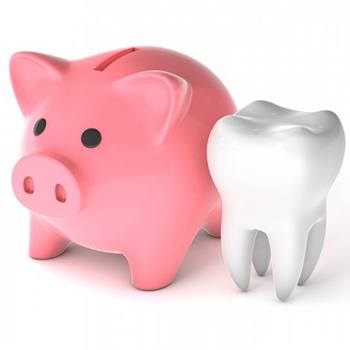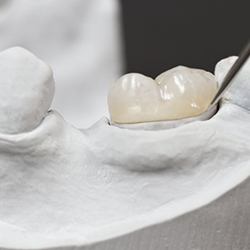Dental Crowns – Wylie, TX
Have a Broken Tooth? We Can Repair It
A dental crown can be used for multiple purposes. Sometimes it might be placed to restore the shape and strength of a tooth that was damaged. At other times it may be a necessary part of the root canal process. And in some cases, it might simply be used to improve a tooth’s appearance. No matter the reason you need a dental crown, Dr. Morton can provide you with a restoration you can depend on. Call us if you’d like to set up an appointment to ask about getting a crown.

Why Choose Wylie Family Dentistry for Dental Crowns?
- Fully Customized, Realistic-Looking Crowns
- Over a Decade of Improving and Protecting Smiles
- Dentist and Team Members That Care
What is a Dental Crown?

Dental crowns are among the most well-known types of dental restorations. The purpose of a crown is to completely cover a tooth, which protects it from further harm and also allows it to continue functioning normally (meaning you can still use it for chewing).
One thing to note about dental crowns is that they’re made with different kinds of materials. Some are made of gold, but others consist of zirconia or porcelain, which can both be customized to resemble tooth enamel, allowing your restoration to look like a natural part of your grin.
The Dental Crown Process

We’ll begin by examining your mouth and taking X-rays of both the tooth and the surrounding bone. This is done to determine whether you may need root canal therapy before having a crown placed. If not, we can move on to the preparation step.
To create room for the crown, a bit of enamel will be taken off the top and sides of your tooth. The exact amount of enamel removed can vary based on what kind of crown you get.
Once we’re sure that the tooth is ready, we will take an impression of your mouth. Both arches are included in the impression; this is done to ensure that your bite is still properly aligned after the crown has been placed.
The impression will be sent to a laboratory, and you’ll be given a temporary crown to keep your tooth safe. After a couple of weeks or so, your permanent crown will be ready, and you can come to our office to have it attached to the tooth.
The Benefits of Getting a Dental Crown

- You can keep using the tooth that was restored with a dental crown to chew all kinds of foods without issue.
- Crowns are quite durable, and they’re very easy to care for, which helps them last for years at a time.
- If your crown is made out of porcelain, it will be able to resist stains better than your natural teeth.
- Crowns are very comfortable, and unlike dentures, you don’t have to worry about them slipping.
- A natural-looking crown that covers a noticeably damaged tooth can give your self-esteem a boost.
Understanding the Cost of Dental Crowns

Dental crowns are incredibly versatile and can easily match the rest of your pearly whites while also strengthening the structure of a compromised one. While there are many benefits to enjoy with these restorations, it’s normal to wonder about the overall price of the treatment. That’s why you’ll first come into our office for an initial consultation with our team so that we can review your oral health and discuss the cost of dental crowns before moving forward. We’ll also go over alternative financing that can help you work within your budget.
Factors That Affect the Cost of Dental Crowns

Here are some of the most common factors that can impact the price of dental crown treatment:
- Severity of the Damage: A tooth that has become extremely damaged may require additional services aside from the dental crown, such as root canal treatment for an infected tooth. This can end up raising the overall cost of the overall treatment plan.
- Materials Used: Your dental crown can often be constructed out of various materials like zirconia, porcelain, or gold—each of which can come with its unique price points. In many cases, our team provides patients with porcelain crowns due to their longevity, durability, and natural-looking material.
Remember that the quality of your dental crown will often coincide with the cost of the treatment. Opting for a lower-cost option often won’t come with great results, and the last thing you want is to pay more due to complications. With professional dental crowns, you’ll be more likely to enjoy better-looking and longer-lasting results.
Does Dental Insurance Cover Dental Crowns?

Since dental crowns are known to be a “major restorative procedure” by the majority of dental insurance providers, you can typically expect to receive some assistance with the cost of the treatment. In most cases, this could involve covering about 50% of the total cost of the service. Even so, every plan will be unique between patients, so you’ll want to double-check the details with your company before moving forward with the procedure. You can even speak with our expert team, as we’re in-network with various PPO plans and will be more than happy to go over your insurance policy with you.
Options for Making Dental Crowns Affordable

For those who don’t have dental insurance, this doesn’t mean you’ll be out of options. Our team is proud to offer alternative financing through a third-party company known as CareCredit. This financier provides various plans that can help turn the total cost of dental treatments into monthly installments, which typically come with little to zero interest. If you wish to learn more about your financing options for minimizing your out-of-pocket expenses, don’t hesitate to get in touch with our office!
Dental Crown FAQs

Have you been told that you need a new dental crown? You may still have some unanswered questions, so we’re here to help. Here are the answers to some of the most common questions we receive about dental crowns in Wylie. If you don’t see the information that you’re looking for below, just give us a call. We’d be happy to walk you through the process of your treatment.
Are Dental Crowns Permanent?
While they technically aren’t permanent, dental crowns are a long-term solution. On average, they can protect your teeth for anywhere between 5 to 15 years. When your dentist reshapes your tooth for a crown, the procedure is irreversible. Tooth enamel does not grow back after it has been lost, so the tooth will always need to be protected with a crown moving forward. That being said, crowns protect the underlying teeth from additional damage, therefore helping them to survive much longer than they likely would have otherwise.
Do Dental Crowns Get Cavities?
It is impossible for a crown itself to develop cavities, but the tooth underneath it still can. In fact, a crowned tooth has about the same risk of decay as an uncrowned tooth. Poor oral hygiene makes it possible for bacteria to travel underneath the crown and wreak havoc on the tooth. Fortunately, you can prevent cavities in crowned teeth the same way you prevent them in any other tooth. Brush, floss, and see your dentist for regular cleanings and checkups.
Does It Hurt to Get a Dental Crown?
Just like when you get a filling, your dentist will numb the tooth that they will be working on when you get a crown. While the procedure itself shouldn’t be uncomfortable, you may experience some sensitivity afterward for a few days, especially if you have also undergone a root canal. This can be managed with over-the-counter pain relievers. If discomfort persists or worsens, give us a call.
Do Dental Crowns Feel Natural?
Within a few days of receiving your permanent dental crown, it should start to feel increasingly natural. Crowns are made from durable materials that can stand up to everyday chewing forces just as easily as tooth enamel, so eating with your crown shouldn’t feel strange. The reason that your dentist reshaped your tooth was to ensure the crown would fit comfortably within the mouth. Additionally, every crown is custom-made based on impressions taken of the tooth. Ultimately, your crown shouldn’t feel awkward or noticeable.
